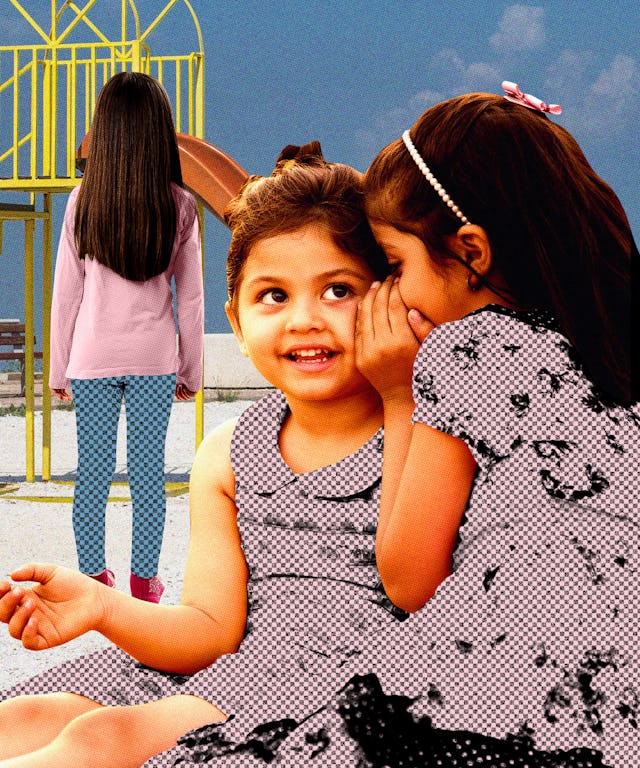Help! I Don’t Want To Raise A Mean Kid
You sometimes have to teach kindness. And it’s not easy.

“I don’t like her.” Nothing like a burn from a 6-year-old. This adorable, lanky-legged, 6-year-old old dressed head to toe in a bunny ballerina print knows herself and isn’t afraid to be herself. I love that. But what I don’t love is her lack of curiosity and level of kindness towards those she “doesn’t like,” and who she doesn’t really know.
Every day, I pass a row of yard signs that read, “An act of kindness a day” and “Be kind today” and “Choose kindness.” Most would probably smile at the sentiment, think nothing negative about those signs and move on. Me? I yell out inside my Highlander, “It’s not that easy! Have you met a 6-year-old?!” Enough with the trite phrases. Kindness is not a simple act for many , especially for kids who are learning there are perspectives and desires of others happening simultaneously with their own perspectives and desires. Put that on a T-shirt, Target.
So what can I do to raise a kind kid? Is there a formula? A fool-proof weekly plan promoted by some mom celebrity? Milk with a “kindness” hormone infused in it? I want, more than anything, to raise kind, empathetic kids who make this world a bit less harsh. I want the “I don’t like her” to become, “I’m still getting to know her – she is different – but I know being different is okay.” I want my daughter to know her life was full of loving kindness, and not just toward herself and toward me, but toward those who are difficult to be kind to.
It starts in the home, and requires ongoing thought and intentionality.
In my case, I had to do some digging into why my daughter didn’t like this girl, let’s call her Sally. What is she believing about Sally? How can kindness take place here? If Sally is being mean to her, then its reasonable she wouldn’t like her. If Sally’s simply different or jointly deemed as “uncool” by my daughter’s friends, then it’s my role to guide her toward kindness without shaming her.
As a neurodivergent adult, I had a suspicion that Sally was also neurodivergent, specifically autistic. I had seen how she approaches my daughter and stands mere inches from her face when greeting her. I had heard her ask my daughter, “Will you be my friend today?”, which is not a common question asked by a neurotypical peer. I had seen how she stims by tip-toe walking and swaying her body. I had seen my own daughter roll her eyes in annoyance. I thought about how my daughter is certainly like many others her age. What they find different is so quickly equated with “disliked.”
After school I asked if we could chat a bit about Sally. My daughter couldn’t pinpoint why she didn’t like Sally. I asked if Sally had any friends. She said no. I asked if I could go “all mom” on her and look at a book with her.
Now, not only am I a neurodivergent educator, but I wrote a children’s book called My Brother Otto about autism. It’s a picture book about two crow siblings, one of whom is Otto, who is autistic. So I said to my daughter, “Your peer seems to be like Otto.”
“Yes!” she immediately replied. I reminded her that just like Otto, her Sally wants to have fun, to be loved and to have friends, she just experiences the world in a different way because of the brain inside her head. It’s not a wrong brain, just a different brain.
“And different is neat!” my daughter proudly responded. That’s a phrase her dad and I frequently say, so it felt like winning a parenting award hearing her say it in context. But I had to take the conversation further. I had to ask my daughter how she could specifically be kind to Sally.I told her to remember Sally wants friends just like she wants friends; no one should be without friends. I told her watching Sally and seeing what she likes to do and then joining her from time to time to get to know her would be helpful and kind. I told her looking out for her at recess and in the lunchroom to make sure she is not alone would also be a kind thing to do.
Immediately I saw a lightbulb click on.The idea that someone her age might be without friends sparked empathy and understanding. She also said she would try some of the things I suggested, and I reiterated to her that she doesn’t have to be best friends with Sally. She liked that.
So are we finished? Are we now kind? No, we’re a work in progress. We’re actively centering our lives around what it means to be truly kind and we are chatting about it. Constantly. And we continue to mess up. I’m trying my best as a mom to model it, and we are reading and referencing children’s books about the plethora of differences that exist from person to person but the commonality of our humanity:our desire to not be alone and to have friends. Our desire to be seen and valued. We are in progress, and I’m proud of us. Us. I think that’s key to tackling the issue of raising a kind kid. Making it a team effort.
Meg Raby is a mom, children's author of the My Brother Otto series, and Autistic residing in Salt Lake City where you can find her playing and working with neurodivergent children as a Speech Language Pathologist and friend, or writing and planning big things in the second booth at her local coffee shop that overlooks the Wasatch Mountains while sipping on her Americano. Meg believes the essence of life is to understand, love and welcome others (aka, to give a damn about humans).